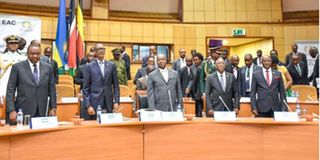A peek at post-Covid East Africa

Presidents Uhuru Kenyatta (Kenya), Paul Kagame (Rwanda), Yoweri Museveni (Uganda) and John Magufuli (Tanzania) and Burundi’s Vice-President Gaston Sindimwo at a past EAC Heads of State Summit.
What you need to know:
- Kenya has been a good East African citizen, being the most diligent payer of dues to the EAC.
- Kenya was handed an easy leg up when Ethiopia’s Prime Minister Abiy Ahmed stumbled in the face of defiance by the Tigray region.
East African countries are making all sorts of noises about getting Covid-19 vaccinations this month and beginning to get shots in arms.
Optimistic projections are that, by June, we might travel a little more freely in the region with Covid-19 vaccination ‘passports’.
One of the first big tests will be the Commonwealth Heads of Government Meeting (CHOGM) scheduled for Kigali, Rwanda, from June 22 to 27. It was postponed last year because of the pandemic.
If the meeting happens, and many East Africans travel to the event, it will be a notable indicator of a return to some normality, or at least the beginnings of it.
However, the East Africa that will emerge from the nearly two-year Covid regime will be anything but normal.
Last year, in July, two countries, Burundi and South Sudan, were facing expulsion from the East African Community (EAC) for being hopelessly in arrears on their dues. It’s unlikely that they have paid up, given the wreckage of the pandemic, and they will be hard pressed to catch up when normal business resumes — if only because the arrears will have mounted.
With the EAC summits not happening and its other activities on hold, it seems there is nobody to sign the expulsion letters. In all probability, the EAC will shrink with the loss of one of the defaulters.
Loss of weight
But such a loss of weight is likely to be short-lived as the EAC would grow fat again soon after. The Democratic Republic of Congo, under President Felix Tshisekedi, who has proved a surprisingly good political schemer, has been knocking on the EAC door. Once viewed as a basket case, the DRC, with the lessons from Ebola, has held up relatively well during the pandemic.
Something else of geopolitical significance has happened: The race between Rwanda and Uganda for DRC’s affections has been intense. Rwanda and Uganda have been embroiled in border closure disputes for two years and have traded accusations over each other’s alleged support for their anti-government forces.
In reality, part of the feud is mineral-rich DRC, which is also Africa’s second-largest country after Algeria. With a population of nearly 90 million, it is only shy of being twice as big the populations of Rwanda and Uganda combined.
Although DRC is not an EAC member yet, it has a one-stop border point with Rwanda. Rwanda’ s trade with DRC has soared while that with Uganda has dropped sharply. Rwanda serves as the unofficial central bank for eastern DRC. If it could entrench further economically in DRC, it wouldn’t need Uganda. And if Uganda did the same, it wouldn’t need Rwanda.
Leaving nothing to chance
Uganda’s President Yoweri Museveni is leaving nothing to chance. He has launched a peculiar road-building spree in eastern DRC to lock it in as a key economic sphere with the development of Uganda’s oil fields in the Albertine region in mind.
The Uganda oil pipeline through Tanzania to the port of Tanga has been hobbled a little by the pandemic. Last September, a masked Museveni visited an unmasked Tanzanian President John Magufuli to sign things and move matters forward. Already an important route to sea for Uganda, and now the main one for Rwanda, Tanzania’s strategic importance to both countries has risen.
Kenya has been a good East African citizen, being the most diligent payer of dues to the EAC. But along the Indian Ocean coastal belt, its uneasy relations over a border in the waters got decidedly worse over this period after its dalliance with Somaliland got Mogadishu’s goat.
Kenya was handed an easy leg up when Ethiopia’s Prime Minister Abiy Ahmed stumbled in the face of defiance by the Tigray region. In November, he ordered a military response, resulting in a short and deadly conflict. Faced by internal restiveness, Abiy seemed to soft-walk a couple of reforms that had wowed the world, including opening up its coveted telecommunications and banking sectors.
There have been signs of prodigal sons returning to Kenya, and in what looks to be an even more environmentally sensitive post-Covid-19 world (we are through with people disturbing the environment and bringing viruses from monkeys, bats and pangolins), many are touting Kenya as a renewable energy leader in Africa. It leads Africa in the solar power systems installed per capita and is the largest producer of geothermal power in the continent.
But these things are like being the popular girl or boy at school. You still have to show up for the prom to dance. With the heat of 2022 politics sucking up so much attention, it is not clear whether Nairobi is focused enough to seize the opportunities.
We know, though, that there are still enough people keeping an eye on events in Kinshasa. After all, the joke used to be that President Tshisekedi’s cabinet was formed at Serena Hotel. The pandemic could end with DRC being an EAC member, propelled by a Kenya-Rwanda-Uganda axis. Each of them have their reasons but at least they all want it in.
@cobbo3





